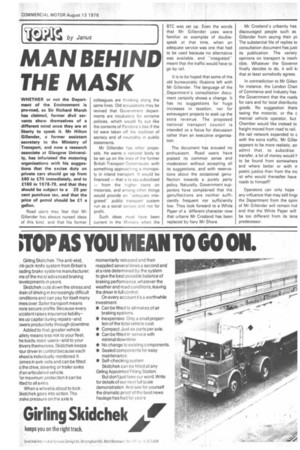MAN BEHIND THE MASK
Page 53

If you've noticed an error in this article please click here to report it so we can fix it.
by Janus
WHETHER or not the Department of the Environment is pro-road, as Sir Richard Marsh has claimed, former divil servants show themselves of a different mind once they are at liberty to speak it Mr Hilton Gi!lender, a former assistant secretary to the Ministry of Transport, and now a research associate at Glasgow University, has infuriated the motoring organisations with his suggestions that the excise duty on private cars should go up from £40 to £70 immediately, and to £160 in 1978-79, and that they should be subject to a 25 per cent purchase tax, and that the price of petrol should be £1 a gallon.
Road users may fear that Mr Gillender has always nursed ideas of this kind, and that his former
colleagues are thinking along the same lines. Old accusations may be revived that Government departments are incubators for extreme policies, which would fly out like the contents of Pandora's box if the lid were taken off the tradition of secrecy and of neutrality in public statements.
Mr Gillender has other proposals. He wants a national body to be set up on the lines of the former British Transport Commission, with something approaching a monopoly in inland transport. It would be financed — that is to say subsidised — from the higher taxes on motorists, and among other things would provide an "adequate integrated" public transport system run as a social service and not for profit.
Such ideas must have been current in the Ministry when the BIG was set up. Even the words that Mr Gillender uses were familiar as examples of doublespeak at that time, when an adequate service was one that had to be used because no alternative was available, and "integrated" meant that the traffic would have to go by rail. '
It is to be hoped that some of the old bureaucratic illusions left with Mr Gillender. The language of the , Department's consultation document certainly shows a change. It has no suggestions for huge increases in taxation, nor for extravagant projects to soak up the extra revenue. The proposed national transport council is intended as a focus for discussion rather than an executive organisation.
The document has aroused no enthusiasm. Road users have praised its common sense and moderation without accepting all its suggestions, and with reservations about the occasional genuflection towards a purely party policy. Naturally, Government supporters have complained that the genuflections are neither Sufficiently frequent nor sufficiently low. They look forward to a White Paper of a different character now that urbane Mr Crosland has been replaced by fiery Mr Shore,
Mr Crosland's urbanity has discouraged people such as Gillender from saying their pit The substantial file of replies to consultation document has justi its publication. The variety opinions on transport is inexh; tible. Whatever the Governrr finally decides to do, it will ki that at least somebody agrees.
In contradiction to Mr Gillen for instance, the London Chart of Commerce and Industry has the Government that the roads for cars and for local distributio goods. No suggestion there taxing the motorist, or the c mercial vehicle operator, but Chamber would like instead to freight moved from road to rail, the rail network expanded to c with the extra traffic. Mr Giller appears to be more realistic; an admit that, to subsidise transfer, a lot of money would h to be found from somewhere and where better or with rr poetic justice than from the ma ist who would thereafter have roads to himself?
Operators can only hope any influence that may still ling€ the Department from the opini of Mr Gillender will remain hid and that the White Paper will be too different from its tena predecessor.




























































































